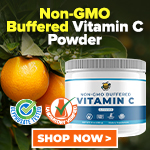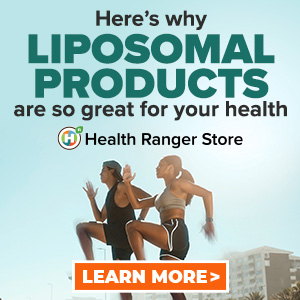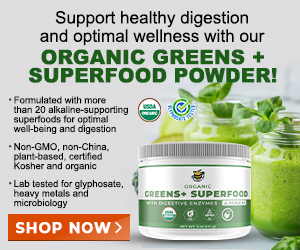Vitamin D reduces inflammation, improves prostate cancer in 60% of men
Wednesday, April 08, 2015 by: David Gutierrez, staff writer
Tags: vitamin D, prostate cancer, inflammation

- Newly released JFK files reveal Pentagon's role in creating Lyme disease and covid in the same lab
- Trump's greatest betrayal so far: Accelerating Middle East wars, silencing dissent, and serving Zionist masters
- Trump nominates VACCINE ZEALOT Susan Monarez to lead the CDC, sidelining RFK Jr.'s reform efforts
- The hidden dangers in your kitchen: How cooking methods impact diabetes, cancer and aging
- STARDUST, a secretive Israeli-US startup, plans risky solar geoengineering experiment to BLOCK OUT THE SUN
- DEADLY DECEPTION: How COVID vaccines increased mortality rates and why authorities hid the truth
- Arkansas embraces medical freedom with landmark ivermectin law
- CDC finally halts $11 billion COVID funding scam as health officials admit the ‘pandemic’ was a fraud
- Lab leak confirmed? Boris Johnson's stunning reversal on COVID origins sparks global debate
- Home gardening for preppers: A beginner's guide to growing your own food
- Analysis: The coming economic collapse, a mass uprising and Trump's three secret weapons to halt the growing revolt
- The forgotten hormone hero: How vitamin C quietly balances mood, stress and reproductive health
- Festive flavors: The sweet history, nutritional profile and health benefits of pecan pie
- Elon Musk: Aliens could be here on Earth RIGHT NOW
- Dr. Mike Yeadon releases 15-minute testimony - WATCH - about genocidal intent of COVID “vaccines”
- Unraveling the paradox: Why intelligent individuals fall prey to everyday blunders
- YouTube’s double standard: CEO defends censorship while claiming free speech champion status
- California's social media censorship law struck down: A victory for free speech or a threat to online safety?
- Newly released JFK files reveal Pentagon's role in creating Lyme disease and covid in the same lab
- Elon Musk: Aliens could be here on Earth RIGHT NOW
- Reclaim your health: How midlife exercise reverses years of inactivity
- Trump reverses course on Gaza plan, says “nobody is expelling Palestinians”
- EPA advisor admits the agency is funneling billions to climate groups ahead of Trump’s return to White House
- Big Pharma's $8 Billion bribery scheme exposed: how doctors are pushed to prescribe junk science, not heal
- Space war brewing? Russia threatens to destroy Starlink satellites
- A lack of integrity in Academia: Harvard professor found GUILTY of fraudulent research to promote CRT theory
- Survival 101: Effective EMF blocking techniques
- Rep. Nancy Mace introduces bill to ban biological males from female facilities on federal property
- Mike Adams Sermon 66: God will DESTROY ISRAEL for its wickedness
- Pilots report mysterious lights 'moving at extreme speeds' across Oregon skies
- 5 Simple steps to boost your brainpower: How to strengthen executive function in a distracted world
- Historian warns Israel may be entering an “IRREMEDIABLE DECLINE”
- Florida takes a stand: DeSantis proposes permanent ban on mRNA vaccine mandates
- RFK Jr.'s SSRI antidepressant investigation sparks liberal meltdown, exposes Big Pharma's dangerous game
- OpenAI whistleblower who dissented against how the company trained ChatGPT found dead
- Sugarcane extract superior to cholesterol-lowering drugs?
- EPA advisor admits the agency is funneling billions to climate groups ahead of Trump’s return to White House
- The Health Ranger releases “Vaccine Zombie” song and music video, using AI-animated zombies for the music video
- California's social media censorship law struck down: A victory for free speech or a threat to online safety?
- Dr. Mike Yeadon releases 15-minute testimony - WATCH - about genocidal intent of COVID “vaccines”
- The pandemic as a tool for INDOCTRINATION: Understanding “The Indoctrinated Brain” by Dr. Michael Nehls
- Mike Adams releases country western hit single: Goin’ Back in Time is Comin’ Home
- Mike Adams releases music poetry sensation: A Child of God
- RFK Jr. clears key hurdle: Sen. Susan Collins backs controversial HHS nominee, signaling a new era for health policy
- Florida takes a stand: DeSantis proposes permanent ban on mRNA vaccine mandates
- Unpacking the Lies That We’ve Been Fed – new song and music video released by Mike Adams, the Health Ranger
- Mike Adams releases new song and music video: Nothing More Disgusting Than a Globalist
- Congratulations to the FULLY UNVACCINATED as you resisted the COVID-19 PROPAGANDA MACHINE fueled by over $100 BILLION
- “Why we influenced the 2020 elections”: Facebook files reveal the coordinated effort to bury the Hunter Biden laptop story
- Michigan sheriff announces criminal investigation into 2020 election crimes, Dominion Voting Systems
- Israeli soldiers accused of even more torture and abuse in the West Bank
- Migrants are taking advantage of recent hurricanes to scam residents and loot their homes
- House Intelligence Committee calls for the ARREST and PROSECUTION of Dr. Anthony Fauci
- Peter Rost exposes Big Pharma corruption in his book “The Whistleblower: Confessions of a Healthcare Hitman”
- Red Cross issues warning to stop blood plasma donations from vaccinated people
- Scientists confirm: GENIUS brain function can be spontaneously unleashed in humans without any apparent cause
- EPA advisor admits the agency is funneling billions to climate groups ahead of Trump’s return to White House
- HYSSOP: What research reveals about the health benefits of this ancient holy herb
- Two containers with completed ballots fall out of truck in Florida
- Fully vaccinated about to see “tsunami” of illness and death, warns virologist
- Global leaders unite to clamp down on “misinformation” with UN-backed Cascais Declaration
- BREAKING: 2025 NDAA authorizes mandatory military draft of WOMEN across America… as Pentagon pursues global NUCLEAR war with both Russia and China at the same time
- Michael Yon warns of a ZIONIST TAKEOVER in Trump’s second administration
- BOMBSHELL: DNA testing kits are a SCAM to develop ethnic-specific bioweapons
- Ozempic and Wegovy weight loss drugs are injectable LIZARD VENOM PEPTIDES that may unleash a devastating wave of organ failure… side effects align with symptoms of SNAKE BITES
- Israeli soldiers accused of even more torture and abuse in the West Bank
- These 13 countries just signed an agreement to engineer a global FAMINE by destroying food supply
- NASA admits that climate change occurs because of changes in Earth’s solar orbit, and NOT because of SUVs and fossil fuels
- RFK Jr. clears key hurdle: Sen. Susan Collins backs controversial HHS nominee, signaling a new era for health policy
- Sermon 30: How Jesus reveals Caesar’s FAKE CURRENCY and FALSE AUTHORITY
- Coriander seeds: Ancient medicine backed by modern science
- Arizona officials claim Maricopa County needs 10-13 days to tabulate results of the election
"We're treating these guys with normal body levels of vitamin D," lead researcher Bruce Hollis said. "We haven't even moved into the pharmacological levels yet."
Vitamin D, which plays an important role in bone and immune health, is produced by the body upon exposure to ultraviolet radiation from sunlight. Prior studies have suggested that it may help prevent or even treat prostate cancer. For example, an earlier study by the same researchers found that, among men with low-grade prostate cancer who took a vitamin D supplement for one year, 55 percent had their cancers become less aggressive. Some of the tumors even disappeared.
Tumors shrank and vanished
Research has shown that many prostate cancers either cure themselves or are so slow-growing that they are unlikely to ever become dangerous. In contrast, aggressive prostate cancer can be highly lethal. For this reason, doctors use the Gleason Grading System to rank prostate tumors in regard to aggressiveness. Patients who get a Gleason score of 7 or higher are considered to have aggressive cancer and are urged to undergo immediate prostate removal surgery.Patients with a lower score, however, are usually counseled to engage in "watchful waiting." Yet many such patients choose to have their prostates removed anyway. These patients must wait 60 days before undergoing surgery, to give their bodies a time to recover from the inflammation caused by the biopsy.
The new study was conducted on 37 men with low-grade (non-aggressive) prostate cancer who were undergoing elective prostate removal. During the 60-day waiting period, the men were randomly assigned to take either a vitamin D supplement (4,000 international units) or a placebo pill. After surgical removal, all the prostate glands were examined.
The researchers found that the prostate cancer in men given a placebo was either unchanged or had worsened. The opposite was found in the vitamin D group.
"In greater than 60 percent of those taking it, vitamin D actually made the cancer better," Hollis said.
Some of the tumors shrank, while some actually vanished completely.
In addition, the researchers found that levels of certain key lipids and proteins were also lowered in the vitamin D group, indicating less inflammation.
"Cancer is associated with inflammation, especially in the prostate gland," Hollis said. "Vitamin D is really fighting this inflammation within the gland."
One inflammation-reducing protein in particular, growth differentiation factor 15 (GDF15), had its activity dramatically increased by vitamin D. Notably, previous studies have shown that aggressive prostate tumors manufacture very little GDF15.
The anti-cancer vitamin
Further research will be needed to uncover the links between vitamin D and prostate cancer. The researchers are working on a larger trial."We don't know yet whether vitamin D treats or prevents prostate cancer," Hollis said. "At the minimum, what it may do is keep lower-grade prostate cancers from going ballistic."
However limited, the study adds to a growing body of research linking vitamin D to reduced cancer mortality. Indeed, as far back as 2008, a study published in the Proceedings of the National Academy of Sciences concluded that if everybody doubled their sunlight exposure, 10 times more lives would be saved from cancer prevention than would be lost to increased fatal skin cancers.
Health experts recommend that light-skinned people in temperate climates get at least 15 minutes of unprotected daily sun exposure on the face and hands. People with darker skin might need two or three times as much; exposure should also increase with distance from the equator.
Sources:
http://www.cbsnews.com
http://www.medicalnewstoday.com
http://www.naturalnews.com
http://www.naturalnews.com
http://truthwiki.org/vitamin_D
Vitamin D at FETCH.news
Get independent news alerts on natural cures, food lab tests, cannabis medicine, science, robotics, drones, privacy and more.
Take Action: Support Natural News by linking to this article from your website
Permalink to this article:
Embed article link: (copy HTML code below):
Reprinting this article:
Non-commercial use OK, cite NaturalNews.com with clickable link.
Follow Natural News on Facebook, Twitter, Google Plus, and Pinterest
Science News & Studies
Medicine News and Information
Food News & Studies
Health News & Studies
Herbs News & Information
Pollution News & Studies
Cancer News & Studies
Climate News & Studies
Survival News & Information
Gear News & Information
News covering technology, stocks, hackers, and more



"Big Tech and mainstream media are constantly trying to silence the independent voices that dare to bring you the truth about toxic food ingredients, dangerous medications and the failed, fraudulent science of the profit-driven medical establishment.
Email is one of the best ways to make sure you stay informed, without the censorship of the tech giants (Google, Apple, Facebook, Twitter, YouTube, etc.). Stay informed and you'll even likely learn information that may help save your own life."
–The Health Ranger, Mike Adams













































